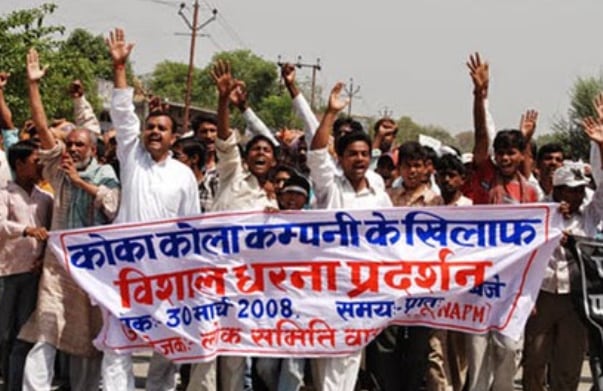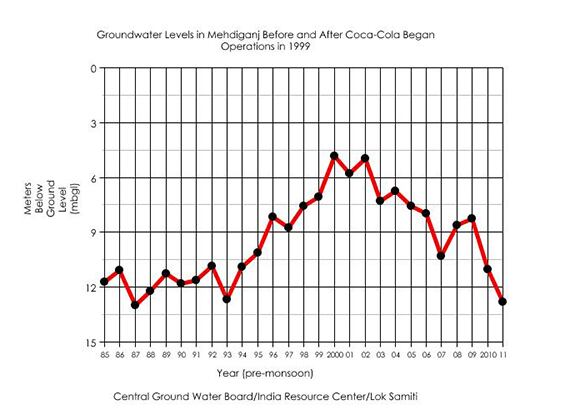Hindustan Coca-Cola Beverages (HCCB) blamed delays on approval from India's Central Ground Water Board (CGWB) - to draw more groundwater on the site at Mehdiganj, Varanasi - and financial losses suffered as a result of its inability to upgrade capacity, which it says forced its hand.
The site is a battleground for HCCB and its critics, most notably the India Resource Center (IRC) which claims that groundwater conditions in Mehdiganj have gone from ‘safe’, when Coke began operations in 1999 – the company runs a returnable glass bottle line at the site – to ‘critical’ by 2009.
The IRC accuses HCCB of mining groundwater in a water-stressed region and causing pollution through effluent discharge, and claims the company announced its intention to abandon the PET line in late August to avoid embarrassment, having had advance warning that the CGWB would reject its application.
In an August 25 press statement, the IRC claimed a “colossal victory” over HCCB, claiming it had been forced to abandon the multi-million dollar bottling line built in 2012 due to sustained local opposition.
‘We will continue our water restoration programs' - HCCB
The IRC continues to campaign for the wholesale shutdown of its Varnasi site, but HCCB said in a statement sent to BeverageDaily.com that it continues to operate in Varanasi and would press ahead with plans to build a new PET manufacturing line elsewhere in the state.
The company dismissed IRC's August 26 press statement as a 'communique' that was, "neither in the interest of local employees nor the local communities".
“We want to reiterate that we will continue with our community development and water restoration/conservation programs in and around our plant at Varanasi,” the company said.

A HCCB spokesman also dismissed the IRC's statement as 'propaganda', but we asked him upon what basis he could say this, since it is clear from documents sent by HCCB to this website that the PET line in Varanasi will need to be dismantled?
"I would...be curious to know that if you asked IRC for similar kind of supporting materials to back up their press releases, what would those documents be?" he replied.
"Would these documents would be legally recognizable and acceptable?" he asked.
'India is becoming a water-stressed country', IRC
But IRC spokesman Amit Srivastava dismissed these comments as "bizarre".
"They should give you a straightforward answer. This is a multi-billion dollar company!" he said, insisting that the IRC had the requisite documents to support its position.
"We're not opposed to every Coke or Pepsi factory in India. The ones that are problematic are those that are based in water-stressed areas," Srivastava said, warning that India was increasingly becoming a water-stressed country.
"The problems also arise in areas where Coca-Cola is using groundwater, as opposed to surface water. In many places they've learned their lesson and are moving towards canal water, river water or even municipal suppliers, but Mehdiganj is not one of these places - here they take groundwater," he added.
"In these kind of areas farmers and local community also use the same source of groundwater to meet all their needs, and Coca-Cola is no small user of water," he said, noting that farmers were heavy water users, but that what they used was returned to local aquifers.

Hindustan Coca-Cola Beverages shared with us its letter dated August 22, sent by its VP of public affairs and communications, Ashutosh Singh, to Alok Ranjan, chief secretary of the Government of Uttar Pradesh, informing the government of its intention to abandon the PET line in Varanasi.
HCCB complains of ‘inordinate delay’ and financial loss
In this letter Singh explains that HCCB built its 600 bottle/minute PET bottling line in 2012 and applied to the CGWB for permission to draw more groundwater as a result of the build.
This is because the Araziline Block, where the plant is located, sits in a ‘critical’ area that would require the company to recharge 200% of any water abstracted from the ground; in the meantime HCCB began mitigation measures including 38 rainwater harvesting projects.
“However, due to inordinate delay in receiving the aforesaid NOC [no objection certificate] causing delay in expansion of capacity leading to financial losses, we have decided not to pursue the expansion at the Varanasi plant,” Singh wrote.
The company would explore options to relocate the new line elsewhere in Uttar Pradesh, Singh added, subject to regulatory approvals, and remained committed to investing in infrastructure within the state.
Srivastava said that to date there had been a lot of opposition to Coca-Cola's, and to a lesser extent PepsiCo's expansion plans in India - last year Coke said it would invest $5bn in the country through to 2020.
"The result has been that these beverage companies have come under extraordinary scrutiny in India, as far as their bottling operations are concerned," he said.
Srivastava said such scrutiny had even led to organizations such as the CGWB dedicating specific sections of their website to companies that used groundwater as a raw material.
"They have the most stringent requirements for these companies - all because of the campaigns across India that are taking place," he added.
*Article amended September 10 2014.
